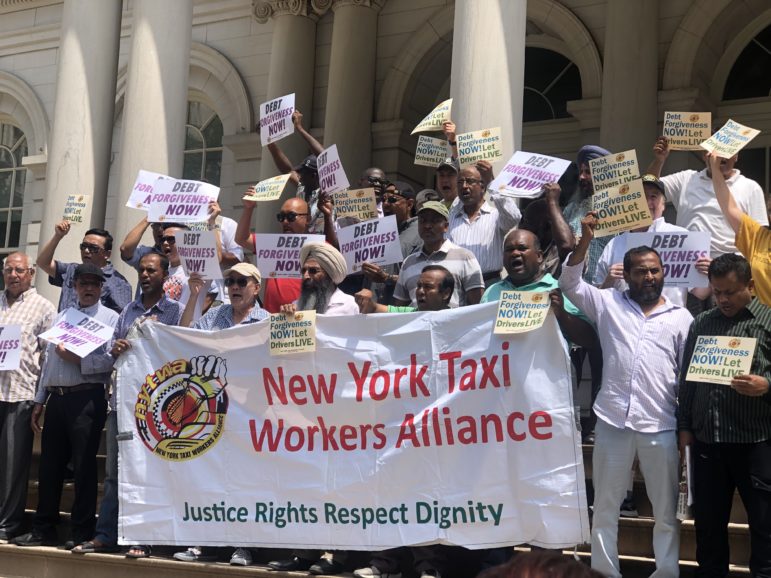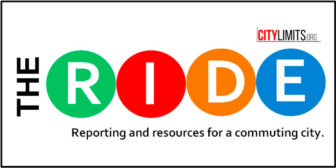
Mia Gindis
Taxi drivers and advocates rallied on the steps of City Hall Thursday calling for the city to help medallion owners who are struggling with debt.
With additional reporting by Anna Rhoads, Manoli Figetakis, Brandon Yam, Lakhsmi Chatterjee, Sadia Haque, Mia Gindis and Rainier Harris from the City Limits Accountability Reporting for Youth (CLARIFY) program.
Elected officials, cab drivers and industry advocates are calling on Mayor de Blasio to bail out debt-burdened taxi medallion owners, arguing the city itself played a role in the crisis when it auctioned off medallions at sky-high prices, despite signs that the industry was heading towards a decline.
Councilmember Mark Levine rallied on the steps of City Hall on Thursday with drivers and taxi advocates, demanding the city intervene more aggressively to help medallion owners, many of whom took out large loans to purchase the permits, only to have the value of their medallions plummet in recent years as competition from ride-hailing apps like Uber flooded the market. A New York Times investigation this spring found that industry leaders artificially inflated the value of medallions, with brokers and lenders convincing drivers to take out risky loans they ultimately could not afford.
Get the best of City Limits news in your inbox.
Select any of our free weekly newsletters and stay informed on the latest policy-focused, independent news.
But Levine and others say the city, too, profited from the industry’s downfall by auctioning off hundreds of medallions in the last two decades at dramatically inflated prices. Such auctions were held as recently as 2014, when the minimum bid was $850,000, according to Levine. Medallions have recently been sold for as low as $138,000, Crain’s New York reported.
“The city itself is culpable. The city itself profited from this bubble. The city itself pumped up this bubble,” Levine said Thursday. “The city itself was asleep as thousands of drivers entered into a world of financial hell which is ruining their lives and those of their families.”
Taxi medallion owners who attended Thursday’s rally told stories of struggling to afford their hefty monthly mortgage payments and provide for their families, working long hours but earning meager profits.
“I have three children,” said Vinod Malhotra, 54, who has been driving a taxi since 1993 and purchased his medallion in 2010. “I worry about them. It’s very hard to break even. I have my rent, my mortgage, my loans, and other expenses. It’s very hard for me to make a living. My kids, when they go to college—I cannot afford all that.”
Another driver, Hakan Humusoglu, says he works long hours to stay afloat but is increasingly anxious about his financial future.
“We have to start from the middle of the night, like 2 a.m., 3 a.m., 4 a.m.,” Humusoglu told City Limits. “I can’t sleep. I’m nervous, I’m angry and I don’t see my future, and I don’t see our drivers’ future.”
A number of taxi drivers have committed suicide in recent years, which many attribute to the industry’s turmoil.
“They paved these streets with their blood, sweat and tears,” said Bhairavi Desai, head of the New York Taxi Workers Alliance. “Whatever they are making on the meter is going straight to pay that loan, and vehicle, and insurance.”
Levine is proposing that the city purchase taxi medallion owners’ mortgages from their lenders, then refinance those loans on more favorable terms, serving as the new lender and offering payment plans that more accurately reflect drivers’ financial realities. De Blasio has previously said such a bailout was not feasible, estimating it would cost the city billions of dollars, according to the Times— but Levine disputes that estimate. The mayor’s office did not immediately return a message seeking comment Friday.
“We are not going to let up until the city pays this moral debt,” the councilman said.
Mohammed Hoque, another medallion owner, says he immigrated from Bangladesh before purchasing his medallion in 2014, and is now struggling to stay afloat.
“I was a federal officer back there [Bangladesh] with a big dream, and now I am becoming beggar,” he says.










3 thoughts on “Councilmember & Taxi Drivers Call for Bailout, Citing City’s Role in Crisis”
Consumers are fleeing the filthy un-air-conditioned taxis in favor of clean air-conditioned Uber/Lyft vehicles.
I always take taxis (yellow or green) rather than Uber or Lyft when I need to and my experience is that all are air conditioned and most are clean and in good condition.
many thanks to CCMs Mark Levine and Carlina Rivera for coming to the defense if yellow cab drives..
they deserve help from the city that tripled their business competition with Uber like black cars which fed the traffic congestion that led to new tax increase by state on yellow cab rides.
there is nothing more convenient and iconic than a NYC yellow cab. older people like myself need quick accessible door to door service for medical visits, grocery shopping and visits. my son always offers to get me an Uber but i feel like i am getting on a horse to get in cause i use a cane.
the taxi cab may be smaller and not as pretentious as black SUV and the driver
may be eating a savory lunch but he/she is usually patient and almost always willing to join in interesting discussion of the pros and cons of foreign lands.